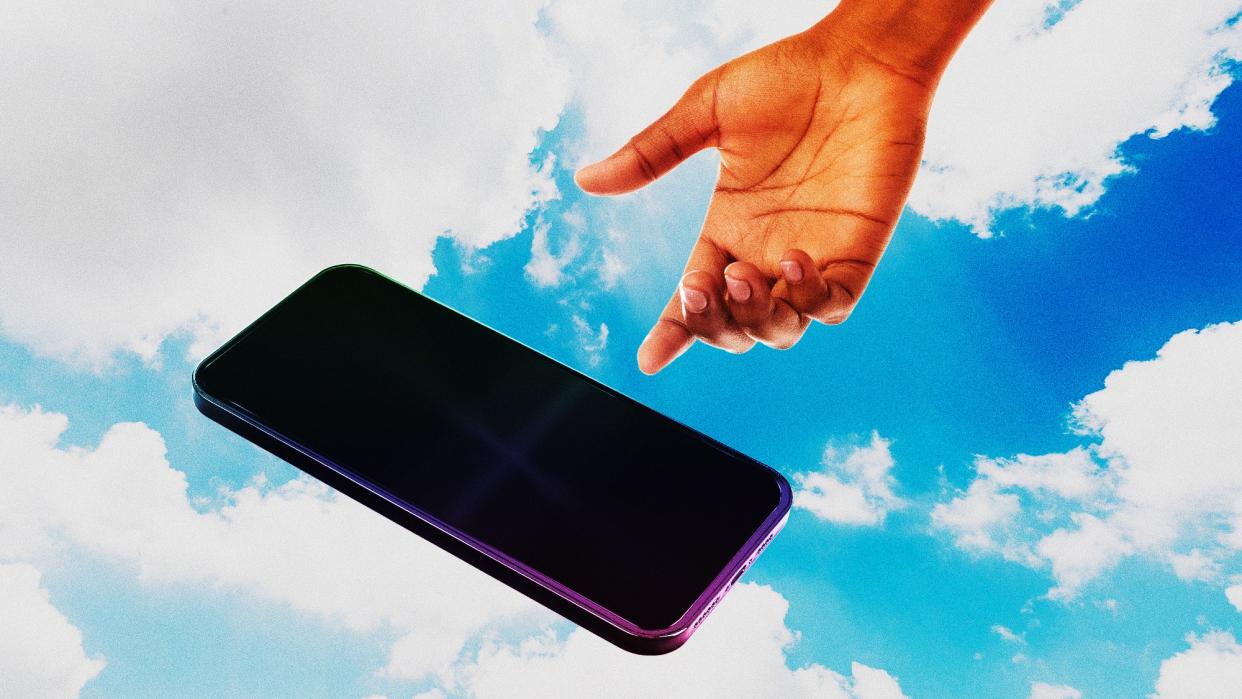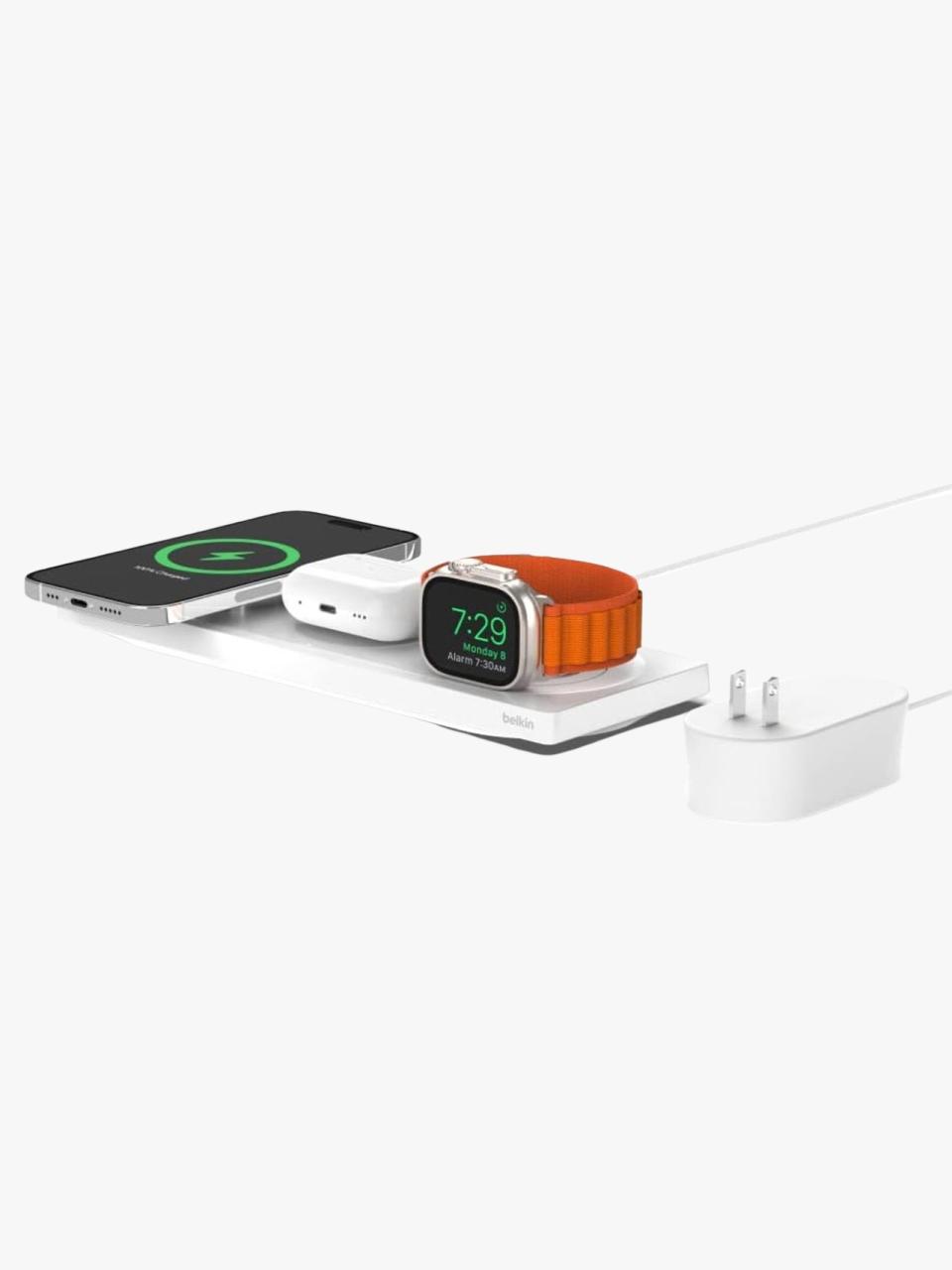How to Stop Your Phone From Taking Over Your Brain

Photographs: Getty Images; Collage: Gabe Conte
There are plenty of good reasons that most of us spend so much time on our phones. Screen time helps us get our work done, it keeps us in touch with our friends, and quite literally helps us navigate the world. Some research does show, especially in the youth, too little phone use can have similar negative effects as too much. I am not a Luddite.
But I walk around New York City and see just about everyone absolutely immersed in their cell phones, face down, often bumping into other people—which, I must admit, I’ve done once or twice. I hesitate to use the word “addicted” when it comes to the discussion surrounding cell phone use. That is both a clinical and loaded term. It’s hard to decipher whether the issue lies in the phone itself or what we do on it—social media, in particular. Regardless, it is undeniable that our use of mobile phones is changing our behaviors and mood states. Research into smartphone use shows increases in everything from back pain to eye strain to feelings of loneliness. Many are so attached to their phone a term has been coined, “nomophobia”, which described the irrational fear of not having constant access to one’s phone (or cell service). Hell, we even have “phantom vibration syndrome” which is the feeling of a notification going off on our phone while it is in our pocket, even though no such notification has come through. Our phones are stimulating us more than ever, seemingly becoming extensions of our neural pathways.
I have personally found the over-reliance on my phone creeping up on me as well. I need to use my phone quite a bit for work, but recently I could feel my phone changing me, and I didn’t like it. I would catch myself reaching for my phone when it was completely unnecessary or falling into the habit of grabbing it immediately upon awakening. The phone, and its tools, were becoming an adaptive crutch instead of a constructive presence.
It was time for change. Here are a few of the strategies, ideas, and products that helped me break up with my cellphone but still remain friends. If you’re also looking to regain a bit of independence from the brick in your pocket, try these out.
Products that helped
A mat charger
I’m an ardent supporter of setting up your environment for success instead of relying on willpower. So if my phone needs to charge, I use a wireless mat charger. This means once I put my phone down to charge I can’t pick it back up. If I can’t pick it back up, I can’t use it. If I can’t use it, I get used to not being on it unless absolutely necessary. Sounds ridiculous, but it works.

MagSafe 3-in-1 Wireless Charging Pad
$146.00, Amazon
A lockbox
A couple years ago I bought a clear lockbox to place my phone in. If I have an important task to get done I place it in the box, put in the code, and sit my ass down and get to work. I turn on notifications for emergencies only. The phone, and everything else, can wait. I call this “Forced Focus.”
I’m a believer in what are called “ultradian rhythms” which I learned about in this 2010 essay by Tony Schwarz. The concept is that your focus works on rhythmic cycles: After going into deep focus for 90 minutes or so, you eventually need a break. While you can force yourself to go for longer, your productivity will eventually substantially diminish. While the emphasis in the wellness world has primarily been on circadian rhythms and how the body operates in 24 hour cycles, research does show that the body also works on these shorter rhythms. The interval you work at doesn’t have to be 90 minutes, you can condition yourself to getting used to concentrating for a structured period of time. You also start to realize how ridiculous you feel when the invisible pull of the phone tempts you to get up, put in the code, check the phone—and there’s nothing there. Keep the phone in the lockbox and lock-in.

Lockabox One
$40.00, Amazon
Practices that helped
I’m a believer in subtraction by addition. When you want to use your phone less, add in activities that will naturally result in the reduction of your phone use.
Delete social media apps a couple days a week
I can’t stress this one enough. Taking a few days at a time off of social media, especially for someone like me, who uses it for work and research, is wildly refreshing. Excessive social media use has been linked to a range of issues including depression and insomnia, so don’t be afraid to take a break and let your brain distance from it. Once you’re back on, you also realize how noisy and often pointless it is. These “unplug days” also allow you to use social media less overall, even when the apps are back on your phone.
Do your chores in the morning
I heard someone call cleaning their home as “resetting” their space for the new day, and that really stuck with me. I’m not obsessive about organization, but cleanliness in my space, especially if I am working from home, has improved the flow of my day substantially. Turning on classical music in the morning coupled with 30 to 60 minutes of cleaning my apartment before the workday both centers me and allows me to—you guessed it—spend less time on the phone. Sprinkle in a few exercise snacks during the morning tidy and it really sets the day off to a clean, focused, and active start.
Take “awe” walks
One day I was out running with a friend and she looked up at a building with a genuine “wow, look how beautiful!” I was stunned, not by the architecture, but by the fact I had run this route a million times before and had never noticed the building. There are legitimate health benefits to noticing and being impressed by things around you—often called taking an “awe” walk. I take breaks to go for walks when I’m working from home or on the road, but instead of having my head buried in the phone, I look up and take it all in. You can do the same.
Work out without your phone at least some of the time
One of the benefits of working out, besides the obvious physical fitness, is the ability for it to help you stay focused in the moment and pay attention to what your body is telling you. Stop using your phone to distract you during your workouts. No texts. No emails. Nothing. The IG Story telling people you’re in the gym can wait.
Try “no phone” dinners
I was on a birthday trip to the Cayman Islands years ago and one of the rules we had was we couldn’t take our phones to dinner. We left them and our rooms and it was magical. We actually had to spend time with each other, converse, chew our food, and be present. Imagine that! My light suggestion is when you are eating and/or spending time with loved ones, try to stay off your phone and tell your friends too so they can get in on the game and you can keep each other honest. This can especially be helpful in romantic relationships as ignoring your partner for your phone aka “phubbing” has been linked to dissatisfaction and feelings of distrust. Disconnect from your phones and connect with each other instead.
Don't use your phone at the same time as your computer
For those of us who have white collar jobs or spend a lot of time on the computer, let me put this lightly…THERE IS NO NEED FOR ADDITIONAL TECHNOLOGICAL STIMULATION WHEN NOT REQUIRED. Unless the task on the computer absolutely calls for being on the phone, don’t use it. While I’m definitely not perfect at sticking to it, implementing this rule has helped me immensely not just by improving my “productivity” but allowing me to be without my phone and realizing it isn’t the end of the world.
Get your notifications under control
This one is simple. Turn off all notifications during working hours unless absolutely necessary. Just save them for the end of the day.
Don't sleep in same room as your phone
My Pops used to always admonish me when he saw me laying in the bed with a phone. “When you are resting, rest,” he would say. I would roll my eyes but he was right–limiting use of your phone before bed and in the bedroom seems to improve subjective well-being and your sleep. We’ve heard about the terrors of blue light and its impact on melatonin but even if you turn the blue light down it's even more beneficial to keep the phone out of the bedroom all together. My strategy? Keep the phone in a room or area down the hall on the mat charger. It’ll force you to get up out of bed in the morning to turn off the alarm and hopefully reduce your snoozing.
The luxuries the phone provides is an absolute boon, who thought we would be able to make video calls halfway around the world? But the same gifts can also lead to a situation of overwhelm. So this is just a gentle reminder to let technology be a tool—and to put in a few protocols to keep it under control.
Originally Appeared on GQ

